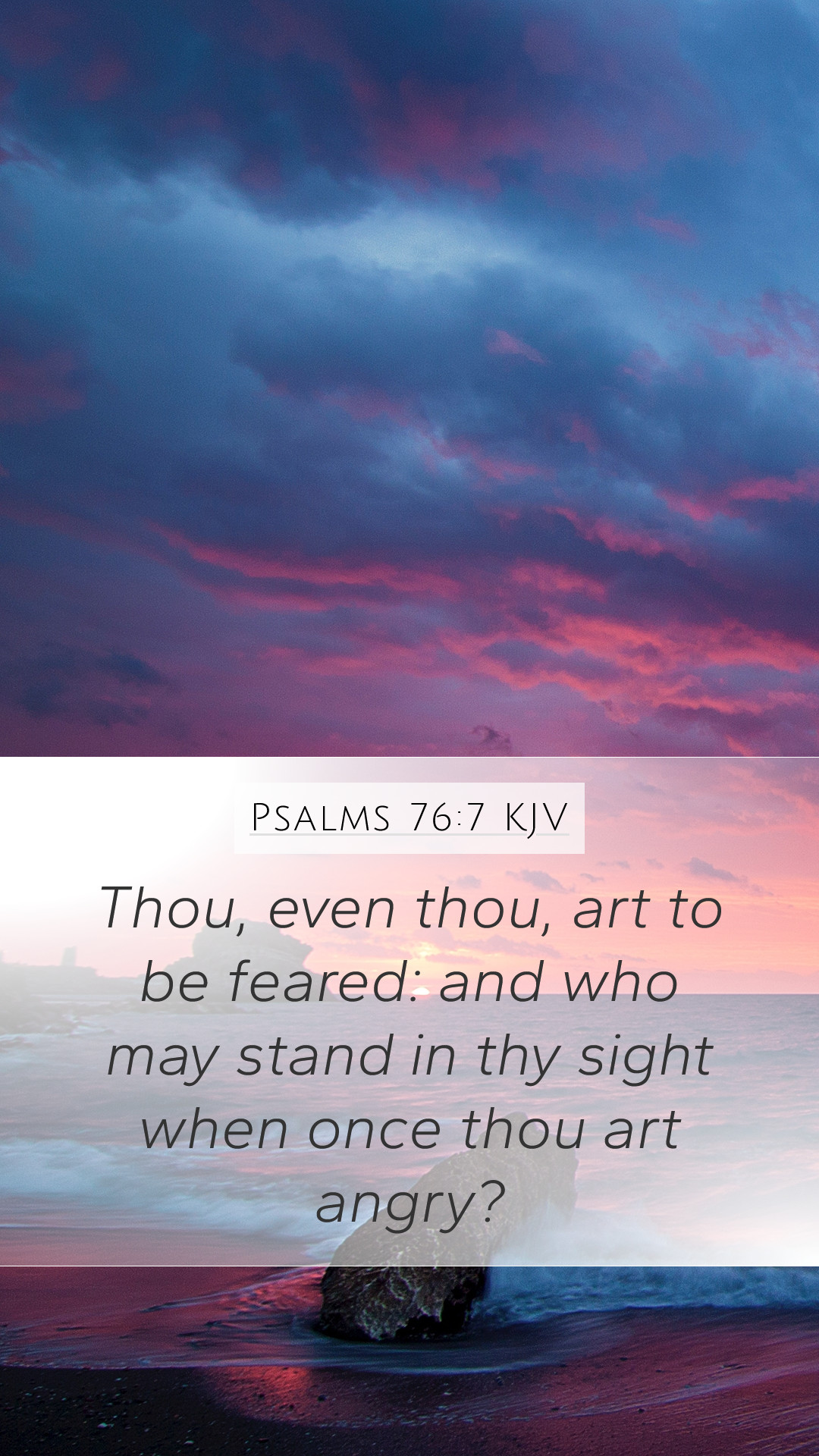Bible Verse Commentary: Psalms 76:7
Verse: "Thou, even thou, art to be feared: and who may stand in thy sight when once thou art angry?" - Psalms 76:7 KJV
This verse expresses profound reverence for God’s power and the fear that accompanies His anger. It serves as a reminder of the might and holiness of God, reinforcing the idea that He is majestic and terrifying in His sovereignty.
Understanding the Verse
The significance of this verse can be understood better through various biblical commentaries:
-
Matthew Henry's Commentary:
Henry emphasizes that God's fearsome nature should instill reverence in humanity. He explains that the awareness of God's anger reflects the seriousness with which one should approach Him. Henry notes that when God's wrath is kindled, it reveals the frailty of mankind that cannot withstand divine judgment. This notion calls for humility and trust in God's mercy.
-
Albert Barnes' Commentary:
Barnes interprets this verse as underscoring the unique status of God as the ultimate deity deserving reverence. He points out that the phrase "who may stand in thy sight" not only illustrates God's holiness but also serves as a rhetorical question meant to provoke thought regarding human vulnerability in the face of divine wrath. Barnes highlights that understanding this fear can lead to genuine repentance and a closer relationship with God.
-
Adam Clarke's Commentary:
Clarke provides a detailed analysis, noting that the verse reflects a historical context of Israel's deliverance from enemies, framing God’s anger as not just punitive but transformative. He explains that this verse encourages believers to maintain a posture of awe and worship towards God, recognizing that His anger can bring about both destruction and restoration. Clarke advocates for a balanced understanding of God's character—both a God of judgment and a God of mercy.
Insights from Scripture
In addition to the commentaries, further insights can be derived from Scripture that reinforces the themes found in Psalms 76:7:
- Hebrews 10:31: "It is a fearful thing to fall into the hands of the living God." - This verse echoes the theme of God’s fierce holiness and the seriousness of His judgment.
- Isaiah 33:14: "The sinners in Zion are afraid; fearfulness hath surprised the hypocrites..." - This aligns with the fear mentioned in Psalms 76:7, highlighting how the awareness of God’s holiness leads to fear among those who transgress.
- Romans 11:22: "Behold therefore the goodness and severity of God..." - This further affirms the dual nature of God’s character as both caring and just.
Application of the Verse in Daily Life
Understanding Psalms 76:7 can lead to meaningful applications in daily life:
- Personal Reflection: Reflect on the majesty of God and the appropriate fear of God’s holiness in your life can foster a more profound respect for divine authority and a desire to live righteously.
- Community Teaching: This verse can be a focal point in Bible study groups to discuss the nature of God and how it impacts our relationship with Him and others.
- Prayer Framework: Encourage prayers that acknowledge God's holiness and invoke a spirit of repentance and humility when approaching Him.
Conclusion
Psalms 76:7 invites us to grapple with the combined themes of divine fear and human frailty. By understanding the commentary and insights from various biblical scholars, we can develop a more nuanced appreciation for God’s character and its implications for our spiritual lives. This verse not only conveys the importance of fearing God but also emphasizes our need for a humble response to His greatness.
Further Study References
For those interested in deeper exploration, consider cross-referencing the following verses to enhance your understanding:
- Psalms 66:5
- Job 25:2
- Matthew 10:28
As you continue your journey in studying the meaning of Bible verses, remember the insights gained from commentaries like those of Matthew Henry, Albert Barnes, and Adam Clarke can enrich your understanding and application of Scripture in your life.


